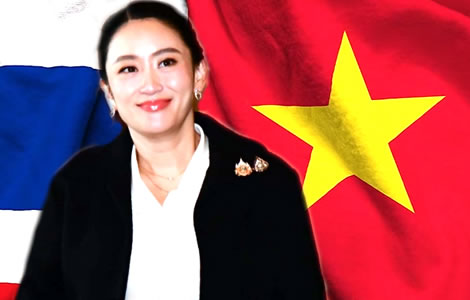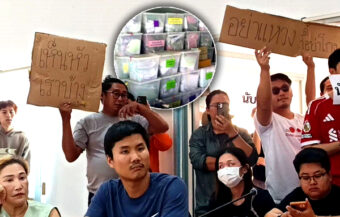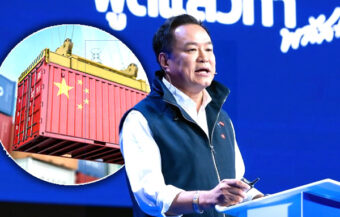PM Paetongtarn heads to Hanoi as Vietnam surges toward overtaking Thailand’s economy, luring tourists, retirees and investors with cheaper costs, better visa deals and booming growth. Talks to boost trade, defence and ASEAN unity set for May 15–16.
Prime Minister Paetongtarn Shinawatra is set to visit Hanoi this week, at a time when Vietnam is rapidly emerging as the most likely contender to overtake Thailand as Southeast Asia’s second-largest economy in the coming years. The Communist state is not only competing with Thailand for investment and export markets but is also now directly targeting its foreign tourism sector. Vietnam is on track to welcome between 23 and 25 million international visitors in 2025. Even more significantly, it is offering more attractive terms for long-term residents, including digital nomads and retirees—positioning itself as a serious alternative to Thailand for global expats.

Prime Minister Paethongtarn Shinawatra will make her first official visit to Vietnam on May 15–16, 2025. The trip, announced by Government Spokesperson Jirayu Huangsap on May 11, marks a major diplomatic milestone.
Thailand and Vietnam will formally elevate their relations to a comprehensive strategic partnership during this visit. The Prime Minister will travel to Hanoi, where she will meet with Vietnamese Prime Minister Pham Minh Chinh.
Both leaders will co-chair the 4th Thailand–Vietnam Joint Round-Trip Meeting (JCR). This high-level dialogue will reaffirm the deepening trust between the two countries. It will also strengthen Thailand’s strategic role in the region.
Vietnam and Thailand to launch strategic partnership based on peace, growth and regional resilience
Significantly, the two governments are expected to sign a Joint Statement to mark this new phase of cooperation. The agreement will focus on three main pillars: Sustainable Peace, Sustainable Growth and a Sustainable Future.
Each pillar reflects shared goals for long-term regional stability and economic resilience. Thailand and Vietnam will also discuss ways to expand trade and investment.
Notably, both countries want to boost two-way trade and deepen economic integration. In 2023, bilateral trade between Thailand and Vietnam reached more than US$20 billion. Officials expect that number to grow sharply in the coming years.
Moreover, the new strategic framework is designed to prepare both economies for shifting global trade conditions. For instance, both sides are concerned about rising import tariffs from the United States.
Therefore, closer ASEAN integration will be a key part of the response. As part of the discussions, Thailand and Vietnam will explore joint strategies to remain competitive in global markets.
During the visit, Prime Minister Paethongtarn will also engage in broader policy discussions. She is expected to explore cooperation in energy, digital technology, infrastructure and education. These sectors have been identified as vital to the future development of both countries.
Security and defence talks signal a new era of cooperation and Thai commitment to regional stability
In addition, the two sides will explore security and defence cooperation. This reflects their shared commitment to peace and stability in Southeast Asia.
It also supports wider ASEAN efforts to manage regional tensions and emerging threats. Importantly, the visit emphasises a new generation of Thai leadership stepping onto the regional stage.
Although this is her first official trip to Vietnam, Prime Minister Paethongtarn has made regional diplomacy a clear priority. Her administration is seeking to build lasting strategic alliances with key ASEAN partners.
According to Government Spokesperson Jirayu, this visit reflects not only symbolic friendship but also practical ambition. “Thailand and Vietnam are ready to become long-term partners in shaping the region’s future,” he said. He added that the comprehensive strategic partnership will serve as a “strong platform for cooperation” in many fields.
The visit is coming as Vietnam is set to overtake Thailand’s economy in the next few years. Despite the US tariff change, the Vietnamese economy is expected to grow by 8% this year. That’s according to the government. In contrast, Thailand is expected to grow by 1.6 to 2%.
In 2024, Vietnam’s GDP was $476.3 billion while Thailand’s was $526 billion.
Vietnam moves to challenge Thailand in tourism and trade while pushing for a US tariff deal by June
The Communist country is also targeting Thailand’s foreign tourism industry. Its target for 2025 is 25 million, in contrast to an estimated 36 million for Thailand. However, Vietnam is emerging as a cheaper destination with more man-made attractions for visitors.
Significantly, Vietnam is drafting a bilateral trade agreement with the United States by mid-June.
At the same time, Bangkok has still not opened formal talks with US trade representatives. Sources close to the Vietnamese side suggested a 22–28% tariff deal after an initial 46% levy.
Notably, on Sunday, Japanese Prime Minister Shigeru Ishiba said his country would reduce tariffs on all US imports to 0% to secure a better deal, particularly regarding Japanese car exports. Thailand, in the meantime, faces a 36% levy in the absence of talks or an agreement by July 8th.
Prime Minister Paethongtarn and her ministers speak of a delayed negotiation process. Indeed, the PM has additionally spoken of a secret deal to end the impasse. Certain economists are warning that in the absence of a deal, Thailand faces only 0.7% growth in 2025.
After that, come reports that Vietnam is also targeting Thailand’s long-term residents, amongst them retirees and nomadic professionals.
Hanoi offers several competitive options. This, combined with a lower cost of living and less corruption, is significantly increasing its appeal. This comes despite a certain loyalty among many foreigners to Thailand.
Of course, for younger digital nomads, that counts for little.
Investor visa offers a long-term path to permanent residency and potential citizenship in Vietnam
Vietnam meanwhile continues to expand its appeal to foreigners with a variety of visa and residency options. The most promising route for long-term stay is the 10-year Investor Visa, which offers a path to permanent residency after five years.
Other options include a five-year visa exemption for specific groups and the Temporary Residence Card, or TRC, which also leads toward more permanent settlement.
The Investor Visa is valid for ten years and is aimed at foreign nationals who maintain a qualifying investment in Vietnam.
It provides a secure route to permanent residence, assuming the investment remains in place for at least five years. After that period, visa holders may be eligible to apply for permanent residency.
This route can eventually lead to Vietnamese citizenship, although further requirements must be met. These typically include proficiency in the Vietnamese language, familiarity with local laws, and a clean legal background.
Meanwhile, the five-year visa exemption is another option but is more limited in scope. It is available to overseas Vietnamese and their spouses or children. It also applies to spouses and children of Vietnamese citizens.
Residence card offers a multi-year stay in Vietnam but must be renewed and supported by local sponsor
The exemption allows multiple entries over five years, with each visit capped at 180 days. However, it does not by itself lead to permanent residency or citizenship.
To remain in Vietnam for longer periods, the holder must apply for a Temporary Residence Card. The Temporary Residence Card allows foreign nationals to stay in Vietnam for up to three years at a time.
It is commonly used by working professionals, dependents of residents, and long-term visitors. Applicants generally need a valid visa, proof of steady income, and a Vietnamese sponsor. The TRC can be renewed and is widely seen as a bridge toward permanent residency.
Once a person has lived in Vietnam for a specific period—typically three years—and meets additional criteria, they can apply for permanent residency.
These criteria often include proof of stable income, legal residence, and in some cases, demonstrated contributions to the local economy or society.
The permanent residence permit is valid for ten years and can be renewed. After five years of holding this status, individuals may apply for citizenship if they meet the full set of legal and administrative conditions.
Vietnam offers budget-conscious expats low daily costs, affordable housing and a growing expat community
In addition to these residency options, Vietnam continues to appeal to budget-conscious travellers and expats.
Compared to neighbouring Thailand, Vietnam remains cheaper in most categories. Accommodation in Vietnam is especially affordable. Budget hotels can cost between $20 and $30 per night. In Thailand, similar rooms usually range from $35 to $45 per night.
Food is another area where Vietnam stands out. Street meals often cost just $1 to $2. In Thailand, these can range from $2 to $4.
Local transportation, drinks, and other daily expenses also tend to be lower in Vietnam. Although both countries are considered affordable compared to Western destinations, Vietnam offers more value, especially outside major tourist hubs.
Experts say Vietnam’s low costs and flexible visa paths are driving tourism and investment away from Thailand
According to travel agencies such as Contiki and Visa2fly, Vietnam is consistently ranked as one of Southeast Asia’s most budget-friendly destinations.
It offers low costs alongside cultural authenticity, natural beauty, and expanding business opportunities. Vietnam’s broad mix of visa options and low living costs make it increasingly attractive for foreign investors, travellers, and expats.
The Investor Visa, in particular, stands out as a strong choice for those aiming to stay long-term. While the five-year visa exemption offers convenience, it does not provide a clear route to permanent residence.
Thai economy thrown into disarray by Trump’s tariffs. Exports and Tourism may both be far lower in 2025
Thailand’s obscure negotiation strategy with United States an outlier as PM promises a ‘secret deal’
2025 Growth could be just 0.7% warns Krungthai Bank as PM grills Tourism officials on falling numbers
Meanwhile, the TRC serves as a crucial stepping stone for those building a future in Vietnam. When combined with the country’s affordability, these pathways contribute to its growing status as a preferred destination in Southeast Asia.
Join the Thai News forum, follow Thai Examiner on Facebook here
Receive all our stories as they come out on Telegram here
Follow Thai Examiner here
Further reading:
Thaksin does not rule out joining talks in US as Thai team finalises plans. They fly out on Thursday


















